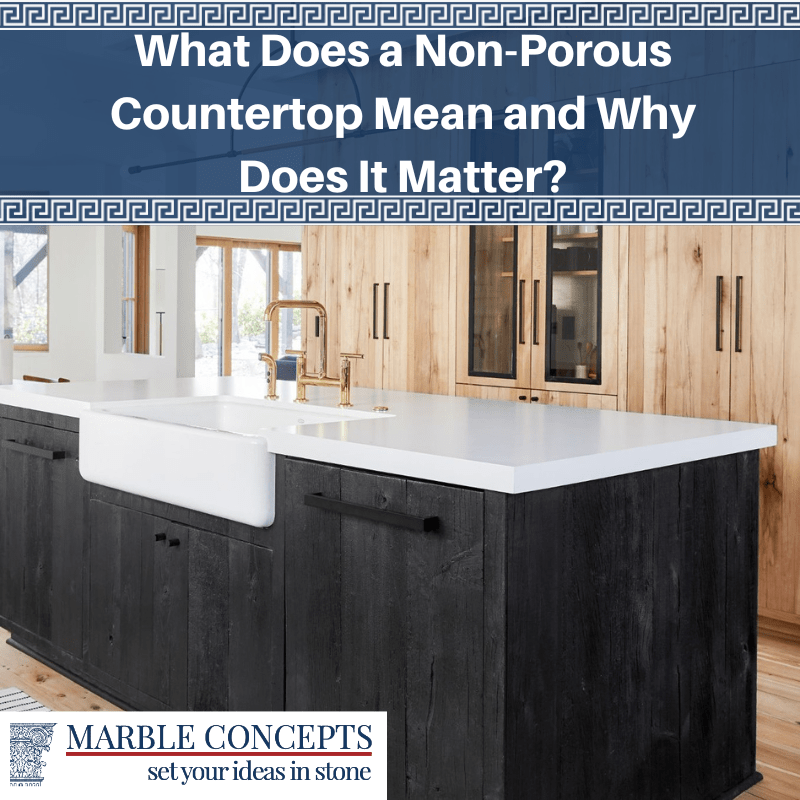When you are trying to choose new countertops for your kitchen or bathroom, you will often hear the words “non-porous.” Although it may seem obvious what that means, you may not be aware of why this is important when choosing a countertop. It is important that you understand exactly what a non-porous countertop is and why it matters, depending on where you will be placing the counter.
Definition of Non-Porous
In order for a countertop to be labeled “non-porous,” it may not allow any air or liquid to absorb into the stone. A porous stone has small pores, or tiny openings, that allow water as well as air to flow through them. When a countertop is non-porous, there are none of these small openings so liquids cannot be absorbed into the stone. A good example of a porous surface is a concrete sidewalk. When it rains, the sidewalk turns a darker color. That is because the stone is designed to allow water to absorb into the stone and then disperse into grassy surfaces nearby. In a non-porous stone, the water either beads up or runs off the surface and does not get absorbed into the stone itself.
Bacteria and Other Substances
One of the reasons you do not want a porous surface in some rooms of your home is that you don’t want bacteria or mold to be absorbed into the stone. Your kitchen is a prime example as you often prepare meals directly on the counter. Even if you have wiped the counter down well, if the stone is porous, bacteria can be harbored in the pores and transferred to the food you are preparing. When you clean a non-porous surface, you can be sure it is not harboring bacteria or mold, making it a safer option in your kitchen. The same is true of bathrooms where you may want to be sure the surfaces are clean. A porous stone may work fine as a fireplace surround or shelving in a living or dining room, however, where bacteria is not as much of a factor, granite companies nearby claim.
Staining and Darkening
Another reason you may want to choose a non-porous counter is that porous counters are more susceptible to staining and darkening. Like the concrete sidewalk, when you spill something on a porous countertop, the liquid seeps into the stone and can cause a dark spot. If the liquid is benign like water, when it dries, the stain may disappear. However, if you spill red wine or coffee, it could seep into the stone and leave a stain. It is important to note this can also happen with non-porous stones as well, especially if there are any cracks or chips in the stone. Some types of liquid, like tomato sauces, fruit juices, and wine may stain if they are not wiped up quickly.
Protecting Porous Surfaces
Although they are porous stones, many homeowners still prefer stones like granite and marble for their kitchens. Marble is especially popular among bakers as the coolness of the stone is perfect for kneading dough. There are ways to protect the surface of granite and marble and make them less porous. Usually, these types of counters require a sealant that is specially designed to close off the pores and make the stone less porous. The sealant keeps liquids and air from seeping into the stone and helps prevent staining. Keep in mind that granite and marble will need resealing periodically as the sealant can break down over time. If you do not reseal them, they are more susceptible to staining than stones that are naturally non-porous, according to granite companies nearby.
Non-Porous Options
If you would prefer a stone that does not require sealing, you may want to choose quartz, according to Marble Concepts. Quartz is one of the hardest surfaces on Earth which makes this option in countertops the best choice for a kitchen counter. Soapstone is another dense rock and offers a softer feel than granite or quartz. It almost feels powdery because it contains a significant amount of talc. It is stain and heat-resistant as well. Even if you choose lighter color options, quartz and soapstone do not stain easily. It is still recommended that you wipe up acidic materials quickly to avoid damage as slight nicks or cracks could lead to staining over time.
Non-Stone Options
Although most people prefer natural stone, there are other options if you want to be sure your countertops are non-porous. Laminate is a relatively inexpensive option for countertops, and it is non-porous. Another new trend in counters, according to granite companies nearby, is recycled glass which is made from resin mixed with crushed glass. These counters offer a wide range of patterns and color styles as well. Stainless steel is heat resistant, stain resistant, and very easy to keep clean, but it can scratch much more easily than other types of counters.
Get Your Next Countertop From Marble Concepts
If you are looking for ideas for counters for your kitchen, bath, or other room in the house, contact Marble Concepts today. Our highly skilled team will guide you through the entire process and help you choose a countertop that is perfect for your home and family. You can arrange for a no-obligation consultation by calling 215-396-7393 to speak to one of our friendly customer service staff today or you can fill out the easy online form.






